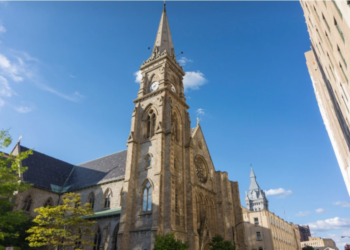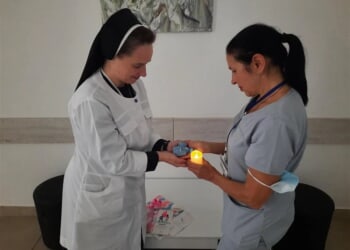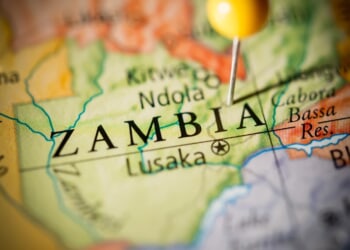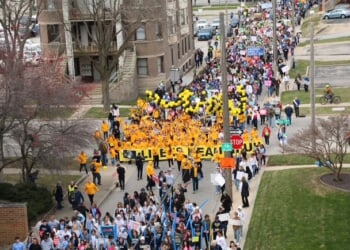Vatican City, Apr 8, 2025 /
13:44 pm
The archbishop of Yangon in Myanmar, Cardinal Charles Maung Bo, starkly described the March 28 7.7-magnitude earthquake that left more than 3,500 dead, nearly 5,000 injured, and hundreds missing, saying it was as if “330 atomic bombs” had been dropped at one time.
“People are very afraid and are exposed to the elements. A powerful earthquake, with an energy similar to that which would have been caused by the fall of 330 atomic bombs, struck our innocent people,” the prelate told ACI Prensa, CNA’s Spanish-language news partner.
“The catastrophe brought apocalyptic scenes and experiences,” he added, after noting the desperation of thousands of people still searching for their relatives under the rubble.
However, amid the desolation, hope continues to break forth. In recent hours, rescue teams — some of them international — have managed to rescue more than 600 people still alive, especially in the hardest-hit areas, where the emergency is reaching epic proportions.
The earthquake struck on March 28 at 12:50 p.m. local time with its epicenter near Mandalay. However, the true extent of the tragedy remains unknown, as many bodies remain to be recovered from the rubble.
The local Catholic Church has also been a victim of the disaster. However, it has been organizing to assist the victims from the very beginning. “The Catholic Church is a wounded healer,” Bo said.
“Many of our parishes and churches have been severely impacted. In other parishes, thousands of people are living out in the open. We are moving quickly with our pastoral concerns, providing water, medicine, food, and shelter to save lives,” he noted.
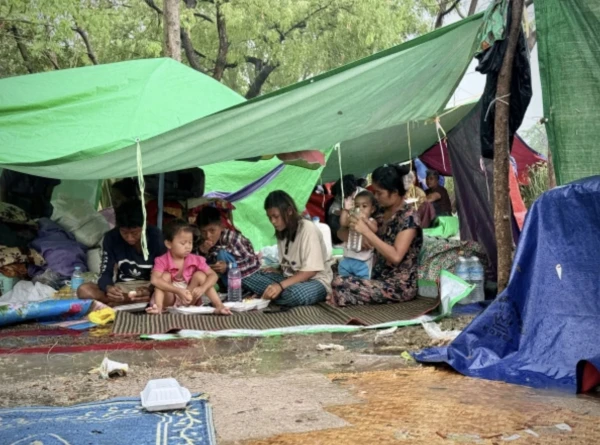
The Church is firmly committed to the population, above all, to alleviate the psychological impact of the tragedy on the inhabitants of the affected communities. “Many of our religious are with the people, providing compassionate accompaniment,” Bo added.
The president of the Myanmar Bishops’ Conference also called for a ceasefire in a country immersed in civil war since a 2021 military coup.
‘This is not the time to take up arms’
“The conflict has totally affected our people. I have called on all parties to respect the ceasefire. This is not the time to take up arms, it’s the time to take up first aid kits and treat people. Unfortunately, this is not happening,” he lamented.
The cardinal also denounced the consequences of the “ongoing war,” which has led to the forced displacement of thousands of people. “The economic collapse and inflation have negatively affected any attempt to deliver meaningful humanitarian aid in a timely manner to the affected population,” he emphasized.
In this context, the cardinal reiterated the firm stance of the Catholic Church: “This is not the time for war. The conflict has inflicted a visceral wound on our people, and conflict only exacerbates these wounds.”
However, the fighting continues, seriously hampering the distribution of aid to affected areas.
“There is an active conflict raging. Even before this catastrophic event, our people were facing great challenges: an endless war, the displacement of millions of people, a lack of adequate medical care, a collapsing economy, and a hard-hit education system,” the prelate noted.
(Story continues below)
Subscribe to our daily newsletter
“The movement of goods and people has been a major challenge in recent years. With inflation and economic sanctions, people were already facing many limitations… and now this earthquake has come,” he emphasized.
The cardinal also explained that “many areas of the country,” including major highways, are “under the control of multiple actors, all of them armed.”
Bo also serves on the advisory board of the Catholic Institute for Nonviolence, a center that opened its headquarters in Rome last year. It offers tools to politicians, international organizations, and local churches to build peaceful societies that promote everyone’s right to a decent life.
Caritas Internationalis, key to the humanitarian response
Amid the suffering, the cardinal highlighted the role of Caritas Internationalis in the humanitarian response.
“We have received a lot of support from church organizations. Caritas Internationalis has been our trusted partner throughout, training our people to deal with natural and man-made disasters,” he explained. “The training and preparation were very helpful. Now they are ready with pledges of humanitarian support for our people.”
The cardinal highlighted the most pressing needs: “They urgently need water, water, and medical care, and the injured need urgent care. They need food and shelter. They need to get back to a normal life and believe in themselves and others again.”
Despite everything, Bo shared a message of hope: “The international Catholic community has pledged its full support. Pope Francis has been a great source of support, and we are deeply moved by the concern shown by the Vatican not only now but throughout these years.”
This story was first published by ACI Prensa, CNA’s Spanish-language news partner. It has been translated and adapted by CNA.




